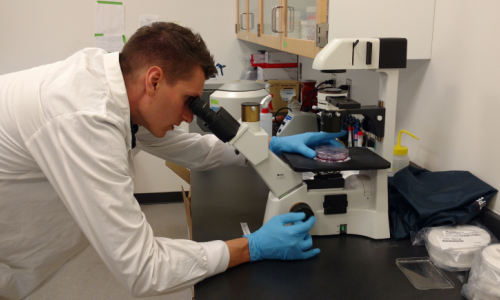
Name: Chris Lo
Position: Recruitment HR Advisor, City of Burnaby
Academic Career: Graduated 2009
Major: Bachelor of Business Administration, Human Resource Management
Chris Lo, in some ways, is the poster child for SFU Business Co-op. For one, he has completed many Co-op terms - seven, to be exact - three of which were spent with his fourth employer who originally hired him for only four months.
But not only was Chris a Co-op student: he was also an active volunteer during his time at SFU. As a Career Peer Educator, Chris has helped students and recent grads with their resumes, cover letters and interviews. Currently, Chris is a Recruitment HR Advisor for the City of Burnaby, named 'Best Run City in Canada' by Maclean's Magazine.
Chris graduated from SFU in 2009 with a Bachelor of Business Administration degree, concentrating in Human Resource Management. The skills he has developed through SFU Business and through Co-op and his volunteer work are integral to his current role. He is a great example not just for Business students, but for all students considering Co-op.
After meeting him at two campus events - Peer Into Your Career and What Can I Do in Government - I've followed up with Chris to ask him to share some of his thoughts regarding Co-op and working for the municipal government. He also answered questions about getting started in the HR field.
Regarding Co-op
1. You've had success with most of your Co-op terms. What advice do you have for students who would like to be successful in Co-op as well?
I'd tell them to take the initiative to help out and learn as much as you can on the job.
2. In the 'What Can I do in Government' session, you've talked about some of the challenges you've faced in Co-op. What advice do you have for students who may not be happy with their employers?
Every Co-op is a learning experience whether it's good or bad. If discussions with your employer do not resolve the issue, definitely talk to your Co-op Coordinator for guidance and support.
3. What were some of your most memorable Co-op experiences, and why?
In some of my most memorable Co-op experiences, it is usually the people that I'm working with that keep things interesting and enjoyable. In one of my Co-op terms, I remember being given the responsibility to help recruit up to 600 volunteers.
The dynamic team environment that I was working in was just awesome and I was just totally stoked in working for that event during the 4 months.
4. How did your participation in the Co-op program give you a competitive advantage when entering the workforce?
My Co-op participation allowed me to gain hands-on experience in my related field of work.
5. Which students do you think will benefit most from the Co-op program?
I think that almost all students would benefit from the Co-op program. It's a great way to use what you have learned in class and see how that applies in a real world work setting. The bonus is that you get paid for it as well!
Working for the Government
1. What advice, if any, can you give current undergraduates on how they can successfully start a career with the government?
Sometimes, you might have to start off in an auxiliary (on-call or part-time), seasonal or temporary full-time position to get your foot in the door. Not everyone is going to get a regular full-time job right away. If you're willing to invest the time, a government job can offer long-term rewards.
2. You deal with resumes and cover letters a lot. Could you tell us some of the most common mistakes applicants make?
Make sure you double check the spelling and grammar; don't forget to target your resume to the appropriate position.
3. What tips would you give students who'd like to stand out during their interviews?
Some key tips that I'd like to give students include:
-
Remember to smile and show enthusiasm and interest in the job.
-
Make sure you've answered each question as comprehensively as you can.
-
Don't be afraid to ask for clarification if you don't understand the question.
-
Prepare and try to do some mock interview practice beforehand with a friend, family member, or with SFU Career Services. Although there are some people who can just wing interviews, it's better if you come prepared.
-
Make eye contact with all members of the panel if you are being interviewed by more than one person, not just the person asking the question.
-
Don't be shy about speaking honestly and sincerely about yourself and your accomplishments.
-
Back up your statements with real world examples; tell a story about what you have done.
4. Do you recommend any designations that students should work on in order to launch a career in HR and recruitment? (i.e. Is a BBA with an HR concentration enough?)
There are various areas of HR that someone can specialize in such as HR Information Systems, Recruitment, Benefits and Compensation, Employee Relations, Occupational Health and Safety, and Training & Organizational Development. Working on getting a CHRP (Certified Human Resource Professional) designation would be beneficial if someone is looking to get into an Employee Relations or HR Generalist type role. However, it would not be a "must have" if someone were more interested in specializing in some of the other areas.
Definitely do some research and see what the minimum requirements are on the job posting, as every organization is different.
5. What student clubs or professional associations should students look into if they want a career in HR?
I would recommend the HRSA (Human Resources Student Association) club at SFU and BC HRMA (BC Human Resource Management Association). Just as a tip, you can purchase a student membership with BC HRMA for only one fifths of the regular price if you are a part-time or full-time student.
6. Which SFU undergraduate courses would you say were the most applicable to the work you do today?
I think the following courses were really helpful:
-
Bus 360 Business Writing
-
Bus 381 Introduction to Human Resource Management
-
Bus 393 Commercial Law
-
Bus 481-3 Recruiting and Selection
-
Introduction and Behavioural related Psychology Courses
7. If you had the opportunity to live your undergraduate career over again, would you choose to do anything different?
Although it was good experience to try out different courses in various areas, I would choose to utilize SFU Career Services sooner in my first and second year of studies to help narrow down what career path to focus on.














